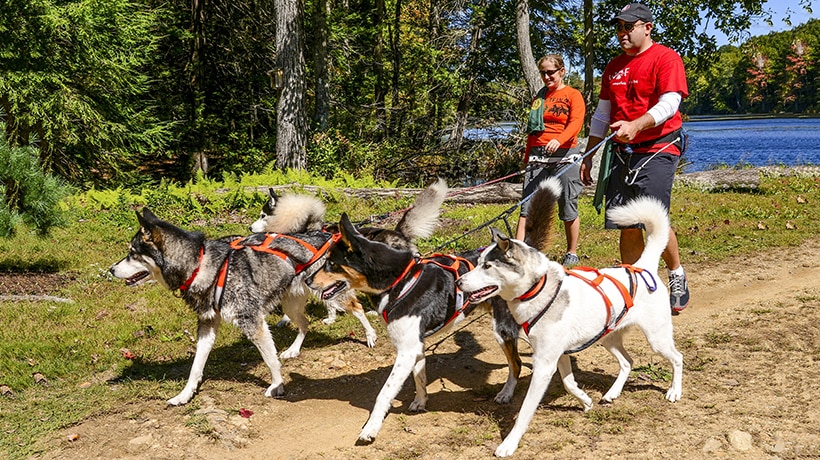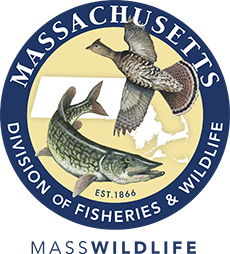- Division of Fisheries and Wildlife
Media Contact
Marion Larson, MassWildlife

Westborough — The Division of Fisheries and Wildlife (MassWildlife) has a long tradition of welcoming dogs on its Wildlife Management Areas (WMA). Dogs are still welcome, but dog handlers must comply with new leash and waste disposal regulations. The new regulations,which take effect on all WMAs on January 11, 2019, require the following:
- Dogs and other domestic animals must be on a physical leash/tether while on WMAs. Leashing dogs decreases conflicts with people and other dogs, resulting in a safer and more positive experience for everyone.
- Dogs may be off-leash only when hunting or hunt-training with licensed hunters under existing regulations, or if they are participating in retriever or bird dog trial events that have been permitted by MassWildlife.
- Dog feces in the WMA must be picked up by dog handlers and disposed of offsite. Licensed hunters engaged in hunting or hunt training, and those participating in sanctioned field trials are exempt from this requirement.
- Dog feces in WMA parking areas and within 100 feet of the parking area must be picked up by ALL dog handlers and disposed of off the WMA.
MassWildlife protects and manages its WMAs to sustain wildlife abundance and to provide wildlife-related recreation such as hunting, fishing, and wildlife-watching. At the same time MassWildlife strives to provide a safe and enjoyable outdoor experience for all visitors.
Over the years, MassWildlife had received numerous complaints from WMA users about negative and unsafe encounters with unleashed dogs and issues with dog waste. The most common complaints included: dog attacks and bites on other dogs (both off- and on-leash) and people, and piles of accumulating dog waste: a nuisance and health concern for pets, people, and wildlife. Other incidents and complaints from WMA users involved: user conflicts between loose dogs with hunters, birders, field trial dog participants, naturalists and hikers; observations of dogs harassing or chasing wildlife; dogs chasing or killing livestock on abutting property; chasing/harassing neighboring property owners and families; dogs spooking horses, resulting in injuries to riders or horses; dogs trampling through posted endangered species restoration projects or newly planted agricultural crops.
The new regulations were drafted after a staff review and presentation to the Fisheries and Wildlife Board. A public hearing was held in February 2018. After considering written and oral comments submitted during the public hearing process, amendments were made and the final regulation package was approved by the Fisheries and Wildlife Board March 14, 2018. The regulations will go into effect on January 11, 2019.
Though many municipalities have leash or animal control bylaws, they do not have legal standing on state lands; the new WMA regulations address this disparity. Enforcement of these regulations, as with all Wildlife Management Area Regulations, is carried out by the Massachusetts Environmental Police. State and municipal police departments also have authority to enforce Wildlife Management Area regulations.
